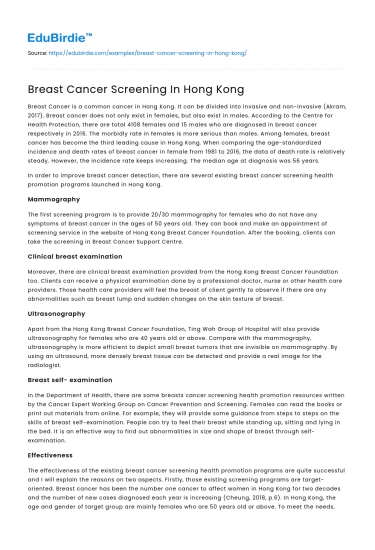Breast Cancer is a common cancer in Hong Kong. It can be divided into invasive and non-invasive (Akram, 2017). Breast cancer does not only exist in females, but also exist in males. According to the Centre for Health Protection, there are total 4108 females and 15 males who are diagnosed in breast cancer respectively in 2016. The morbidly rate in females is more serious than males. Among females, breast cancer has become the third leading cause in Hong Kong. When comparing the age-standardized incidence and death rates of breast cancer in female from 1981 to 2016, the data of death rate is relatively steady. However, the incidence rate keeps increasing. The median age at diagnosis was 56 years.
In order to improve breast cancer detection, there are several existing breast cancer screening health promotion programs launched in Hong Kong.
Save your time!
We can take care of your essay
- Proper editing and formatting
- Free revision, title page, and bibliography
- Flexible prices and money-back guarantee
Mammography
The first screening program is to provide 2D/3D mammography for females who do not have any symptoms of breast cancer in the ages of 50 years old. They can book and make an appointment of screening service in the website of Hong Kong Breast Cancer Foundation. After the booking, clients can take the screening in Breast Cancer Support Centre.
Clinical breast examination
Moreover, there are clinical breast examination provided from the Hong Kong Breast Cancer Foundation too. Clients can receive a physical examination done by a professional doctor, nurse or other health care providers. Those health care providers will feel the breast of client gently to observe if there are any abnormalities such as breast lump and sudden changes on the skin texture of breast.
Ultrasonography
Apart from the Hong Kong Breast Cancer Foundation, Ting Wah Group of Hospital will also provide ultrasonography for females who are 40 years old or above. Compare with the mammography, ultrasonography is more efficient to depict small breast tumors that are invisible on mammography. By using an ultrasound, more densely breast tissue can be detected and provide a real image for the radiologist.
Breast self- examination
In the Department of Health, there are some breasts cancer screening health promotion resources written by the Cancer Expert Working Group on Cancer Prevention and Screening. Females can read the books or print out materials from online. For example, they will provide some guidance from steps to steps on the skills of breast self-examination. People can try to feel their breast while standing up, sitting and lying in the bed. It is an effective way to find out abnormalities in size and shape of breast through self-examination.
Effectiveness
The effectiveness of the existing breast cancer screening health promotion programs are quite successful and I will explain the reasons on two aspects. Firstly, those existing screening programs are target- oriented. Breast cancer has been the number one cancer to affect women in Hong Kong for two decades and the number of new cases diagnosed each year is increasing (Cheung, 2018, p.6). In Hong Kong, the age and gender of target group are mainly females who are 50 years old or above. To meet the needs, woman health service center will first prioritize their target group with the trend. Secondly, those programs can bring longer time effects on reducing the mortality of breast cancer. After the mammography screening, females who get a positive result on breast cancer can identify their problem on an earlier stage such as stage I cancer metastasis. Patients can also seek help from the doctors and make consultation with the health care providers. If there are no such breast cancer screening programs, people may lose the golden hour to treat their breast cancer.
Problems
There are some potential risks under mammography. Every 200 out of 2000 females may receive a false positive result after the screening. People may suffer from anxiety and carry out unnecessary treatments after the screening which is treated as a waste of time and money. Also, the mental health of clients will be greatly reduced as they feel afraid of the consequence after being diagnosed on breast cancer. Moreover, mammography may bring negative result to clients who have breast cancer truly. This kind of mistake may give a wrong message to clients, leading them not to be aware of their actual health. Finally, deterioration of breast cancer will be existed.
Need
It is essential to enhance the use of media in the promotion of breast cancer screening. The screening habits among these patients were poor, with over 60% never having undergone mammography screening before their cancer diagnosis. (Sitt, 2018, p.171). Government should put more emphasis on the media advocacy such as promoting the efficiency or available screening programs through television and internet. Regardless of geographical barrier, this practice can encourage our target audiences by increasing their participation and familiarize with the screening programs. They are not subjected to the time and location. When the help of media, people can have better ideas on the procedures, prices and sites of having breast cancer screening.
Challenges
It is challenging to provide free of charge breast cancer screening to all the females and males residents in Hong Kong. Due to the high cost of 2D/3D mammography, government may exist financial imbalance when they spend too much expenditure on medical to provide equity. It is known that the proportion of self-financed screening programs provided by private sectors are higher than the free one by . However, it is not affordable for some low-income groups and families. Because of the barrier of household income, they are hardly to receive the equal needs as middle- or high-income groups. It is a difficult task for government to strive for the balance so as to reduce inequalities in health prevention.






 Stuck on your essay?
Stuck on your essay?

